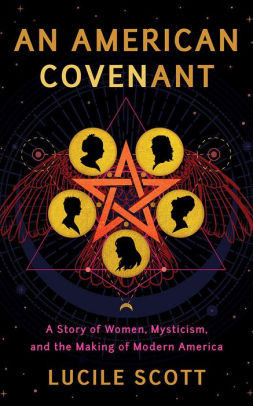Thank goodness for the library! I was scrolling through a list of new books my local library had ordered when this caught my eye: "For centuries, women who emerge as mystic leaders have played vital roles in American culture. For just as long, they’ve been subjugated and ridiculed. Today, women and others across the nation are once again turning to their mystic powers to #HexThePatriarchy and help fight the forces that seem bent on relegating them to second-class citizenry" (from the publisher). Intrigued, I had to see more (well done to whomever wrote the backcopy!) and took it home to read.
Expecting a history lesson threaded through a biography, what I discovered was a fantastic voyage. Author Lucille Scott brought the lives of five women mystics -- Marie Laveau, Cora L. V. Scott, Helena Blavatsky, Zsuzsanna Budapest, and Marianne Williamson -- together in a densely woven tapestry of biography and historical commentary and used her own spiritual journey to anchor that tapestry into current events. The five women are the author's "mighty spirit companions" -- women who were out of place in their own time and society, speaking their minds and not caring that society could (and would) crush them down. Each ostensibly rose above it all and produced something remarkable. Each contributed to the feminist movement's evolution, yet each (according to Scott) was erased from history.
The first Section on Marie Laveau is brilliant, the strongest of the five presented. Placing Laveau's life and works accurately, and elegantly, within the context of racism and shifting gender dynamics. Scott's writing skills shone brightest here with the creation of a textured, nuanced, narrative. I knew almost nothing about Cora L.V Scott, in Section Two, one of the best-known mediums of the Spiritualism movement of the last half of the 19th century. Learning about her was a pleasure and I feel the author succeeded in rescuing Scott from erasure. Section Three's narrative about Helena Blavatsky was just as fascinating, reveling much more about her enigmatic character than I was previously aware of. If only for these three sections, I would recommend An American Covenant.
It is in the last sections that the author stumbles.
The fourth section is ostensibly about Zsuszanna Budapest, Scott only briefly mentions the most controversial parts of Budapest's contributions to modern mysticism: transphobia. Budapest, and her Dianics, absolutely deny their teachings and circle to any person not born female, calling any person -- trans, intersex, etc. -- who wishes to do so, "A bully." These kinds of absolutist statements have created terrible pain within the Pagan community but instead of exploring this further -- which would seem to be the logical place to go in a book that describes itself as a "scathing queer feminist history" -- the author begins talking about Starhawk, the creatrix of Reclaiming, an explicitly feminist and political tradition of witchcraft. The section thus ends with "Z's ragtag bunch of feminists" taken to the world by Starhawk.
For me the most revelatory section was the last one on Marianne Williamson. As one of many familiar with her A Course on Miracles, my impression of her was one of yet another New Age guru-type with delusions of grandeur (to run for President). Scott portrays a woman searching for context in a fluctuating society of shifting mores, opportunities, and expectations and is clearly somewhat in love with Williamson's message and presentation of self. Despite the author's best efforts, Williamson's enormous privilege shines through, overwhelming any attempt at fostering a sense of recognition with her readers. Her inclusion in this book feels jarring and wildly out of place. No part of Williamson's life is erased, her narrative is loud and bold.
The reader will either find Scott's personal biography engaging and relevant, or massively distracting; for me it was both at various times. Moreover, I don't agree that the five women chosen were "erased from history". Each has had their name besmirched and their works denigrated, but for very different reasons.
Overall, I enjoyed An American Covenant with the caveats, above.
~review by Lisa Mc Sherry
Author: Lucille Scott
Topple, 2020
$24.95, pp. 300
We have a review of a new book about Reclaiming here.
An American Covenant: A Story of Women, Mysticism, and the Making of Modern America

©
2010 - 2025
Facing North
